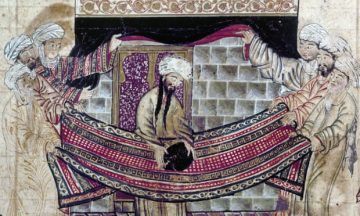Sameer Rahim in The Guardian:
 Like many recent years, 2013 saw Richard Dawkins tweet a summary judgment about Islam. “All the world’s Muslims have fewer Nobel prizes than Trinity College, Cambridge. They did great things in the Middle Ages, though.” The coarse implication in his first statement is hardly softened by the condescending allusion to the “great things” done by past Muslims. Still, it was only a tweet. Islamic Empires, Justin Marozzi’s new work, is a 464-page elaboration of the same argument, with additional bloodshed and sleaze.
Like many recent years, 2013 saw Richard Dawkins tweet a summary judgment about Islam. “All the world’s Muslims have fewer Nobel prizes than Trinity College, Cambridge. They did great things in the Middle Ages, though.” The coarse implication in his first statement is hardly softened by the condescending allusion to the “great things” done by past Muslims. Still, it was only a tweet. Islamic Empires, Justin Marozzi’s new work, is a 464-page elaboration of the same argument, with additional bloodshed and sleaze.
Marozzi opens by quoting a Tunisian friend who is “embarrassed to be an Arab these days”, distressed as he is by the “chaos, fighting, bloodshed, dictatorship, corruption, injustice, unemployment” plaguing the Middle East. The Tunisian certainly has a point, but it’s one that Marozzi misconstrues. Marozzi advises his friend to think back to a time when “for an Arab Muslim, pride in occupying the very summit of the global pecking order, rather than shame and embarrassment at languishing in its nether regions, was the order of the day”. But Arab spring protesters, just like this Tunisian, were complaining about their corrupt rulers and calling for a fairer society, not the restoration of what Marozzi calls a “famed” and “feared” caliphate in order to satisfy their “pride”.
The author offers potted histories of 15 mainly Arab cities across the 15 centuries of Islam. He picks them during their most opulent eras: Baghdad in the ninth century; Cairo in the 12th; Constantinople in the 15th; Isfahan in the 17th; ending with Doha in the 21st. As a journalist, he has visited nearly all the cities he describes, and begins his chapters by speaking to interlocutors often depressed about the state of their country. Then he swiftly whisks us back into a glorious past, emphasising the most lurid tales.
More here.
